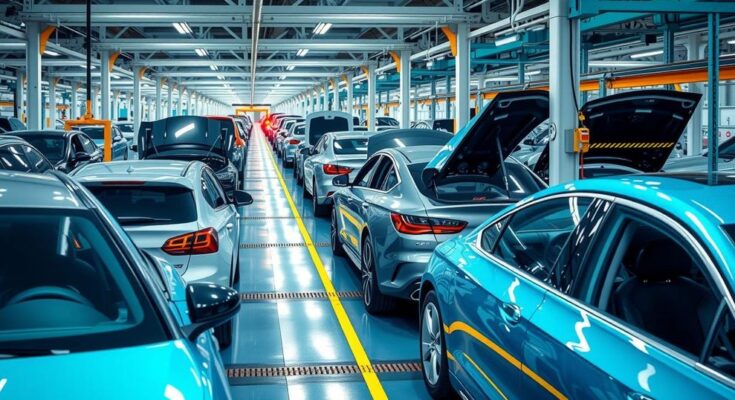Argentina’s automotive sector reported a significant production increase of 41.1% in February, totaling 42,419 units. Exports rose by 102.1% compared to January, though they decreased by 4.6% year-on-year. This growth is attributed to recent tax reductions by the government, with calls for further fiscal measures at local government levels to enhance industry competitiveness.
Argentina’s automotive sector experienced considerable growth in February, achieving production of 42,419 units. This figure represents a remarkable 41.1% increase from January and a 13.1% rise compared to February 2024, according to a report by the Association of Automotive Manufacturers (ADEFA). Exports also saw a notable growth of 102.1% from January, reaching 22,496 vehicles, though this was a 4.6% decline in comparison to the same period last year.
Additionally, wholesale sales to dealers displayed a substantial increase, totaling 45,617 units—a 33.8% rise from January and a 37.3% increase year-on-year. Over the initial two months of 2024, production rose by 20.5%, amounting to 72,477 units. However, exports witnessed a decline of 13.5% to 33,628 units, while sales during January and February totaled 79,706 units, which reflects a remarkable 62.1% increase from the preceding year.
Martin Zuppi, President of ADEFA, attributed the automotive sector’s strong performance to recent tax reductions implemented by the national government. He emphasized the necessity for provinces and municipalities to adopt similar fiscal measures to enhance industry competitiveness. Zuppi suggested that reductions in local taxes—such as property taxes and sales taxes—could substantially lower operational costs for automotive manufacturers and improve the sector’s export profile.
Zuppi remarked, “With 18 working days of activity and even with some plants in recess due to vacations, as well as due to adaptation processes for new investments, the sector recorded a good performance in line with what was anticipated last month.” Furthermore, he expressed satisfaction regarding the progress in collaborative initiatives with government authorities to reduce the tax burden, which he believes will significantly enhance competitiveness and revitalize activity levels across all metrics.
In conclusion, Argentina’s automotive industry is witnessing a notable expansion marked by increases in production and sales. The combination of government tax reductions and potential local tax reforms aimed at supporting manufacturers bodes well for the sector’s future competitiveness. With ongoing collaboration between automotive leaders and government authorities, the industry is poised for continued growth and sustainability.
Original Source: en.mercopress.com




